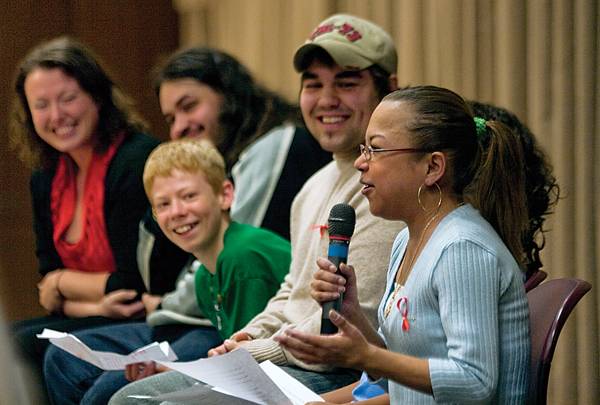People share stories of living with HIV

Lupe Avendano, 23, of New Hope, Minn., shares a discrimination experience on Tuesday, Dec. 2, 2008, during the Journey for Hope: Children Affected by HIV/AIDS in the Sun Room of the Memorial Union. Avendano experienced discrimination for having HIV while in a hospital in Mexico, but got sick on the nurse to teach her a lesson. HIV/AIDS is only transmitted through four body fluids, blood, semen, breast milk and vaginal secretions. Photo: Josh Harrell/Iowa State Daily
December 2, 2008
In a society hesitant to talk about HIV, One Heartland shares a new message. The “Journey of Hope” presentation shared stories of hope and a brighter future about young people struggling with HIV.
One Heartland runs camps in the United States: Camp Heartland in Minnesota, Camp Pacific Heartland in Malibu, Calif., and Birth Family Alliance in New York.
“Our job is to provide a community for people that are dealing with the virus,” said Sarah Mollet, community fundraising coordinator with One Heartland.
“Journey of Hope” consisted of speeches given by four people who have been diagnosed with HIV at a young age or dealing with the virus in their family.
The presenters only gave their first names because of fear of backlash back home.
Lupe Avendano, who agreed to give her last name to the Daily after the presentation, did not know she had contracted HIV through a blood transfusion until she was 12. She received the blood transfusion when she was 6. She will celebrate her 24th birthday on Dec. 12.
Avendano talked about growing up with HIV.
“It wasn’t that scary for me like other kids,” Avendano said.
Nicholas, who is only 9, spoke about the effect his sister, who has HIV, had on him.
“I’ve known that my sister has HIV since I was a baby,” Nicholas said.
He said he couldn’t sleep because he was scared his sister was going to die.
“I went to bed crying, not knowing if I would see my sister in the morning,” Nicholas said.
He also shared his goal for the future, despite “the virus being in my life.”
“I’ve learned that I can change the world by speaking out about my experiences with the virus,” Nicholas said. “Thanks to Camp Heartland, I’ve set a goal to become a scientist and find a cure for HIV.”
Rey is one of the oldest people still alive with HIV, who has had the disease since he was a baby. He is 28 years old and has exceeded his doctor’s expectation of how long he has to live. He was 13 when he was diagnosed with the virus.
Rey spoke about having little hope growing up with HIV. He has taken 21 of the 26 available medications for the virus. He contracted HIV through his mom, who received it after she was raped.
Despite the hardships, Rey keeps his spirit up.
“I’ve kind of decided I’m going to live forever,” Rey said.
He also said he would not change the fact that he was HIV.
“I think everything we go through in our lives makes us who we are. All things considered, I’m flawed like anybody else, but I’m pretty happy with who I am,” Rey said.
The last speaker was Darrell, who is 12. He was diagnosed with HIV when he was 1 year old and was not expected to live past the age of 5.
Darrell shared about himself, his hobbies and the subjects he likes in school. He said he was afraid to tell his friends he has HIV because their parents might overreact.
“You can be my friend without getting HIV,” Darrell said.
















